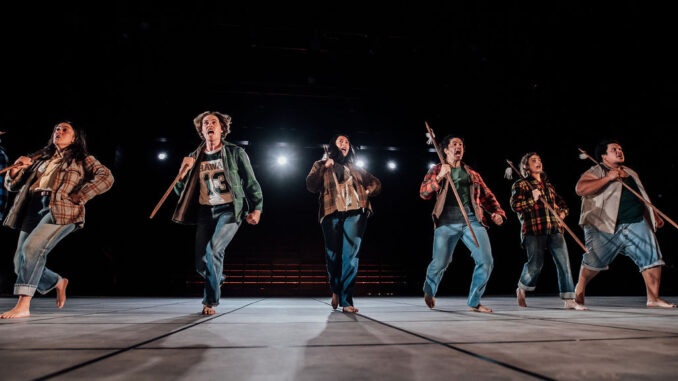
[Weathering the Storm]
On the 20th April, 2021, the Prime Minister, the Deputy PM and Aotearoa’s leading epidemiologist converged at BATS Theatre to watch an uncanny mirror image of our country’s 2020 Covid-19 lockdown. The play was Transmission, created by Stuart McKenzie and Miranda Harcourt, which used verbatim extracts of interviews primarily with Jacinda Ardern, Grant Robertson and Professor Michael Baker to recreate the events of Covid-19’s arrival in Aotearoa and to understand the actions of some of our pandemic’s main players.

As an early draft of history, Transmission (which was subsequently offered as a digital recording) is already a curious theatrical artefact of our pandemic era – produced before Omicron, or even Delta, entered our lexicon. The Spinoff’s Adam Goodall, who had spent 2020 in the UK, noted the global significance of the April production: “there are so few places in the world right now where 80-odd people can gather in a small room to watch a live performance without risking a super-spreader event.” Transmission ended with projections of blue skies and an uplifting sing-along of David Kilgour’s ‘Today is Gonna Be Mine’, with the mantra “I’m gonna keep on flying.” In my review I wrote that despite this hopeful conclusion, “the Covid story locally and globally is far from over. If there are to be great Covid-related plays that emerge from the pandemic, I feel confident in saying that the great Covid plays will not come from Aotearoa New Zealand. And that – touch wood – is this country’s great blessing.” Writing now, with the benefit of hindsight as 2021 stumbles to the finish line, we can see that Transmission only told Act One of our Covid story – bigger tests of our country and politicians’ resolve were yet to come.
It has been another tough year for theatre and live arts. We’ve tried to keep on flying. It has seen us holding on for dear life, whilst also trying do the messy work of enacting a cultural change in the arts to fix a broken status quo.
This time last year, I concluded 2020’s theatrical year in review with the observation that “Aotearoa’s theatremakers find themselves one of the best placed in the world to pursue their practice… Now is the time to tell our stories, elevate our artists.” I noted the determination “to fundamentally reshape and embed how we value artists in Aotearoa…To help us reimagine and reconceive our potential as individuals and as a national community. To support our collective wellbeing. To bring us together to debate, connect, and share.”
Gains have been made, albeit slowly, and arts practitioners end the year exhausted by the effort. This is the story of Year Two of the pandemic: whilst Delta came and upended everything, we cannot let it take away from the incredible successes and wealth of theatrical activity that we enjoyed in 2021.
Golden Weather
In 2021 Bruce Mason would have been 100. The pioneering playwright thought of himself as something of a lone voice in an arts wilderness, but I think he would have been amazed and delighted to survey the abundance of theatre that gone on this year, particularly from independent creatives. As summer opened Auckland Fringe and NZ Fringe were bursting with confidence with a bumper crop of shows – the biggest festivals to date. Add Auckland Pride, Dunedin Fringe, and a hyper-local Auckland Arts Festival, and theatregoers were set for quite an extended summer. But, to paraphrase Mason’s The End of the Golden Weather, summer would soon be at an end.
Auckland Fringe
Our Theatre Scenes reviewers in Tāmaki Makaurau attended shows including Mr Melancholy, GHOST MACHINE. Outta the Mouths of Babes was one of the shows responding to Basement Theatre’s Fringe provocation of making documentary theatre (which, as we will see, turned out to be one of the big themes of theatre this year). Bianca Michelle found the “casual inclusivity and compassionate outlook” of the return season of Sunrise was a heartening sign of the kinds of stories Gen Z are capable of telling. 2014 UK play Birdland however felt out of time In the Fringe lineup, Michelle calling it “a relic of a very different time when it maybe felt more justified to hand-wring over the souls of the rich and toxic.” Standard Acts offered a more interesting investigation of toxicity, through an examination of power structures within relationships via wrestling bouts between Arlo Gibson and Karin McCraken. Jess Karamjeet reported: “Round after round [Karin] tries different techniques to win – surprise attack, submission – but loses every time. Nevertheless, finding energy from the depths of her, when – to everyone else – she seems down and out.”
That wrestling metaphor might also be read as the experience of trying to mount shows in the midst of Covid restrictions. Seasons of many of these shows over summer ended up being touch and go, with some, like Standard Acts, playing delayed dates.
Covid in the Community
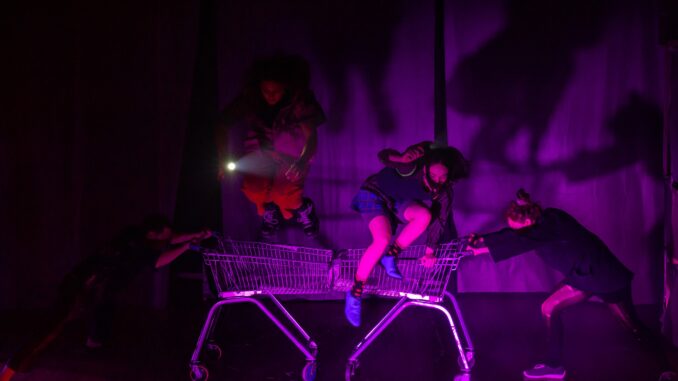
On 14 February, 3 cases of Covid-19 were announced in the community. Auckland moved to Level 3 (aka no live shows), and the rest of the country moved to Level 2 (aka shows with reduced capacity).
My heart, like many others, sank. I had been due to fly to Auckland that week to premiere my new work Dr Drama Makes a Show With You, and came to terms that it would be very unlikely we would be able to go ahead. But on 17 February it was announced that Auckland would move to Level 2 at 11:59pm. I drove overnight from Wellington to Auckland to make it (and would not recommend it!), we packed in and reblocked the show for level 2 distancing, and opened as planned on the evening of 18 February. It was an eerie season, and a bit ridiculous really – already capped for smaller audience numbers, we were the only show playing in the cavernous Aotea Centre complex. Auckland Live’s Fringe Town programme had been all packed in, but had to be cancelled. I felt incredibly fortunate to have got the show on, and had the opportunity to connect with audiences coming out of the snap lockdown (although our Covid luck would run out later in the year during the Delta outbreak).
The touring company of Red Leap’s Dakota of the White Flats also had a mash dash caused by the 14 February lockdown, as described by guest reviewer Mary De Ruyter: “the speed at which the Red Leap Theatre crew bolted out of Auckland on Valentine’s Day to get to Whangārei just before the midnight lockdown – to perform the world premiere of new show Dakota of the White Flats a few days later – must have at least matched the speed with which 14-year-old protagonists Dakota Pink and Treacle Duck hurtle through their urban wasteland of a home.”
On 22 February all of New Zealand was back at level 1, and we thought we had dodged a wider outbreak. But on February 28th Auckland found itself back in level 3, and the rest of the country in level 2.
Jennifer Ward-Lealand, starring in Auckland Theatre Company’s Two Ladies, dramatically found out about the latest lockdown after stepping off stage. Her story was recorded in Sam Brooks’ article for The Spinoff ‘Not just a bump in the road: Performing artists on lockdown’s cruel blows’:
Five minutes earlier a barrage of Covid alerts went off for the 550 audience members but we on stage didn’t know what the hell was going on. It was loud but not fire-alarm loud, and no one from front of house was coming into the theatre with high-vis vests on so… we just ploughed on and finished the show, and the Auckland season. My first words in the wings were “What the hell was going on?!” and our lovely stage manager answered, “Level three from 6am tomorrow for a week.
With a host of shows in Auckland Fringe impacted, the Fringe decided to extend the festival into April. This would go on to allow for delayed seasons of shows including You Are [Not] Alone Here, Coded, Godzonia and Over my Dead Body: Uninvited. It was also awful timing for Auckland Arts Festival, which had been set to open on March 4.
On March 7th Auckland moved into level 2, then level 1 on March 12th.
Auckland Arts Festival
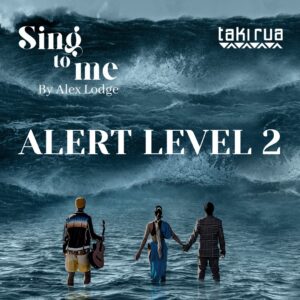
Taki Rua’s Sing to Me was the first of the Auckland Arts Festival events to belatedly open (with reduced capacity) on March 11th. An examination of clashing cultural values and climate change, Taki Rua’s programming of Pākehā playwright Alex Lodge’s play was a statement of ongoing partnership, but the production would have benefitted from further development prior to embarking on a national tour. Rand Hazou noted the work’s resonance for parents:
As a story about parents from different cultures attempting to navigate cross-cultural currents, the play holds special significance for the writer, director and cast. As Miriama McDowell points out in her Director’s Note, all but one of the cast and crew for the show are children of Māori and Pākehā parentage. One of the more poignant aspects of the play is the way writer Alex Lodge, a Pākehā mother with a Māori son, has captured the ebb and flow of a relationship dealing with the aspirations and fears of new parents. In one scene a pregnant Whetū complains about her achingly heavy body and wonders whether walking on land will ever get easier. In another, Ata’s nerves fray from the lack of sleep which he manages by going for nighttime walks and taking up smoking. There is a truthfulness in the writing and presentation of these moments that transcend cultural differences and allows audiences to acknowledge the universal trials and tribulations of parenting.
Trick of the Light’s The Griegol was initially halted by Covid, but was handed a lifeline from Thom Monckton, who invited Trick of the Light to share Q Theatre’s Rangitara space with his own show The Artist. Anuja Mitra marvelled at The Griegol’s non-dialogue narrative, with music replacing speech: “It would be exciting to see more theatre that does not rely on words; not only would this make it a more accessible medium for many theatregoers, but it would encourage creators to truly think about how they convey their ideas.”
Vela Manusaute debuted his new show Tropical Love Birds, with Jess Karamjeet questioning the rigour of the play’s depiction of domestic violence in her review.
Strasbourg 1518, which told the story of a mysterious dancing pandemic, drew “momentum from points of connection between its historical inspiration and the current Covid-19 pandemic” (Brigitte Knight).
Theatre Continues
With Tāmaki Makaurau’s summer outbreak of Covid behind it, a golden weather of theatre continued into autumn. Reviewers enjoyed Twinless, Change Your Own Life, The Downs & Ups of Peep & Squeak, Bunny, Wonderful, First World Problems 3.0 and Boom Shankar. Dominic Hoey’s 45 Cents an Hour played Basement and BATS theatres, keeping the topic of arts workers remuneration firmly in the spotlight. Alice Kirker’s Cake Baby celebrated personal and public acts of being fat in our society” (Grace Hood-Edwards). Rutene Spooner’s Thoroughly Modern Māui was a highlight of the Auckland Live Cabaret season. Christchurch’s Court Theatre alternated actors in the title role of Frankenstein.
Auckland Theatre Company and Proudly Asian Theatre
Single Asian Female represented a series of ‘it took until 2021?!’ firsts for Auckland Theatre Company, as explained by Sam Brooks for The Spinoff: “the first time Auckland Theatre Company has programmed an East Asian work as part of their main programme. It’s also the first time a show of theirs has had predominantly East Asian leads, and the first time the company has collaborated with Proudly Asian Theatre Company, whose goal is to serve Aotearoa’s Asian community and theatre practitioners.” The show also provided an opportunity for Pōneke-based director Cassandra Tse to make her ATC directorial debut, transposing Australian writer Michelle Law’s script to a NZ setting. Cynthia Lam reviewed the show:
it was great to see such a charming cast of Asian women on stage, telling their stories in a frank and humorous way. Together with the soundtrack consisting of Cantonese pop songs by Aaron Kwok and Chinese classics by Taiwanese singer Teresa Teng, I was transported back to my own experiences as a Chinese woman growing up in Hong Kong and New Zealand. I believe that although the story recounted on stage was particular to the Chinese migrant population, universal themes of mother-daughter relationships, single parenthood, wanting to fit in with one’s peers and trying to carve a space out in the world for one’s self are experiences we may all relate to –– as Pearl wisely says: ‘food is the great equaliser, our stomachs are the same’.
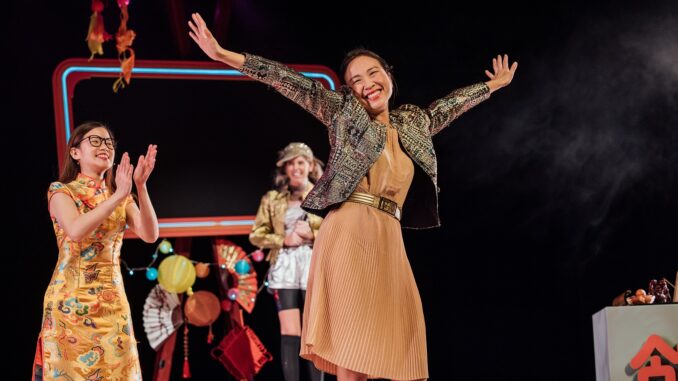
On Theatreview, Renee Liang pointed out that “ATC is some 25 years late to the party” in programming East Asian work – “it’s a good start. But it’s only a start.” Liang posed pertinent questions in relation to ATC’s “mainstage” programming:
In todays’ performing arts scene where innovation and collaboration has seen the mushrooming of new companies and new venues, how relevant is the use of the term ‘mainstage’? Should these companies still continue to claim the lion’s share of public funding? In today’s Aotearoa, with an increasingly diverse audience, savvy at selecting which companies and venues to follow for their specific interests, is there really a ‘mainstream audience’ anymore?” Maybe one day we’ll even be able to stop billing ourselves as Asian creatives, and just be creatives.
While great for ATC to come to the party (following up on their 2019 collaboration with Prayas on A Fine Balance), there was no shortage of local writers the company might have programmed. Two significant additions to the canon in 2021 came from new playwrights Talia Pua, Sherry Zhang and Nuanzhi Zheng with support from Proudly Asian Theatre. Jess Karamjeet found Pua’s Pork and Poll Taxes to be “a moving tribute to those affected by the Poll Tax, and by divisive, racist immigration policies” and a “must-see performance from some of Aotearoa’s most talented, emerging actors and practitioners.” Irene Corbett paid tribute to Proudly Asian Theatre’s efforts with ATC’s Here and Now production of Zhang and Zheng’s Yang/Young/杨:
ATC should look to the success of Yang/Young/杨 and see the bright future of theatre in Aotearoa, see the talent of the creative team and the performers, see the joy and hunger of the audiences. This hunger, to watch your life unfold in front of you, to lock eyes with a performer whose face reflects your own, both demands change and remind us that it is not just a question of what stories are told but who gets to write and tell them.
Documentary Drama
The standout production of 2021 goes to another of ATC’s productions: The Haka Party Incident written and directed by Katie Wolfe. Set to debut in 2020, and then delayed again by the February 2021 outbreak, the production finally made it across the line in April. Exemplifying the interest in doco-drama, Katie Wolfe illuminates – through the verbatim words of those that were there – a showdown involving activists He Taua standing against the mock haka tradition of University of Auckland Engineering students in 1979. This incident of racist harm had much to reveal to contemporary audiences about ongoing injustice, cultural oppression, partnership, healing, and aroha. Anuja Mitra wrote that
the show’s impact is clear through the kia oras and murmurs of agreement that ripple through the audience, particularly on lines like ‘being Māori is something no one can take away from you.’ Finally taking to the stage after numerous Covid-19 delays, The Haka Party Incident continues a vital conversation we should all be having about tearing down racist institutions and standing in solidarity with tangata whenua.
The Haka Party Incident was again Covid-disrupted later in the year when its national tour was halted by the Delta outbreak. Reflecting the mana of this production, venues and festivals across the country were lining up to host it. Making a vital contribution to our self-awareness as a nation, The Haka Party Incident should be seen by as many people as possible – let’s hope the tour can reassemble for 2022.
Another doco-drama impacted by the pandemic was Barrier Ninja by Fran Kawene, which was reprogammed by Auckland Live for Matariki following the Fringe Town cancellation. As described by Anjula Prakash, “Barrier Ninja looks at the obstacles faced by Māori in getting healthcare and the inequity that leads to unequal care between Māori and Pākehā. Barrier Ninja’s moving and sometimes harrowing accounts are relayed through the play’s compelling use of verbatim theatre.” The play has been performed as part of the Hauora Māori medical curriculum at the Dunedin School of Medicine, Otago University, but as Prakash states, “medical professionals aren’t the only ones that need to see the show. It is an effective and moving piece of theatre.”
Theatre Rainbow
Theatre reflecting a wide spectrum of identities in our rainbow community was at the forefront of our stages in 2021. In Pōneke, Wellington Pride celebrated the milestone productions The Eternal Queers by Estelle Chout, which had a creative team of predominantly queer BIPOC, and He Tangata by Jayden Rurawhe and Paris Elwood, led by and telling the stories of tākatapui. In Tāmaki Makaurau, Fala Muncher by Lyncia Muller, Jaycee Tanuvasa and Disciple Pati returned to explore the intersections of Pasifika identity and queerness. Into the Bush reinvented a proto-queer Elizabethan play Gallathea as a rainbow circus theatre spectacular. Jennifer Cheuk loved the connection between gender performativity and circus performance, stating “it is refreshing to see bodies as powerful refractions of shadow and light, rather than sexual things to be gawked at.”
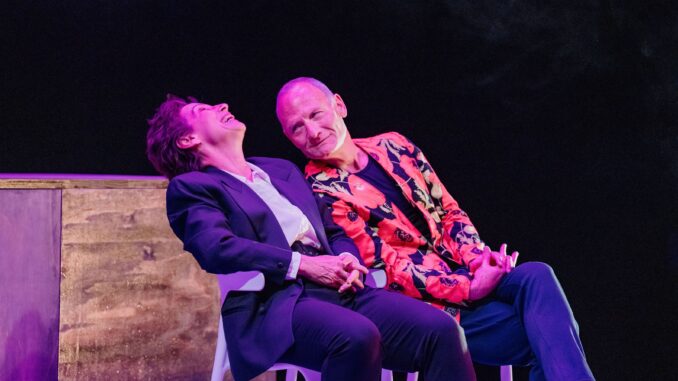
After a long development, Everything After, written and directed by Shane Bosher played a high-profile season at Q Theatre’s Rangatira. Nathan Joe ruminated on the play’s significance:
There are few plays in our country’s queer canon. And there are fewer plays in our queer canon that celebrate the experiences of older gay men living with HIV… The narrative demands we never forget the horrors of the AIDS crisis. That we are still living in the wreckage of that crisis. It’s not subtle, and it doesn’t pretend to be, especially as the play veers towards pure melodrama in the second act. It’s a pretty taxing catalogue of gay male trauma. The play’s subject matter, much like its character, is fighting for relevance in a culture that seems to have moved on quickly… This isn’t a play set in a historical moment in time, but the long ongoing aftermath, where you are expected to move on. This tragic irony tinges the play. The irony of being an AIDS survivor during an era where bareback sex and preventative medication is in abundance.
Indian Ink Theatre Company
Indian Ink toured Paradise or the Impermanence of Ice Cream, written by and starring Jacob Rajan. Meditating on mortality, the play took on a horrible resonance in light of the global pandemic. Molly Daley explains:
The inability for Meera and the Parsi people to have the death rituals they desire is not an uncommon situation for many in India to find themselves in. The Covid-19 outbreak recently affecting India has disrupted the practices of mourning and death for people in many communities, religions, and ethnic-groups alike. Even in New Zealand, tangihanga and funeral were among the most discussed gatherings disrupted during lockdown periods. By activating our prior experiences, Indian Ink bring empathy and support for their characters and situations in the production, and for those facing the effects of vulture depopulation and other barriers to ritual, that otherwise may have been overlooked due to cultural differences.
Te Pou Theatre
Te Pou theatre opened its new Tokomanawa Theatre whare with Rawiri Paratene’s swan song production Peter Paka Paratene. A tribute to Paratene’s exceptional career and humanity, it was a fitting way for a living legend to pass the baton to new generations of Māori theatre makers.
Te Pou followed with Kūpapa by Nicola Kawana, telling the story of Lucy Takiora Lord and her work as a guide and interpreter for British commanders during the Taranaki Wars in the 1860s. Erin O’Flaherty reflected that as Pākehā reviewer:
this story serves to remind me that colonisation was not a one-and-done. It is an on-going process that continues to this very day, and I’m sure the struggle of Takiora to rectify the two sides of herself is one that will be familiar to many in Aotearoa. Many of us, myself included, know very little about the New Zealand Wars and the individuals who lived through the period, and that is such a shame. But this play was thrilling, entertaining and powerful, and I want to drink it all up. These are the stories that we should be telling – those that bring the history of this land to life, and those that remind us why knowing our history is vital to moving forward.
Kia Mau Festival
A highlight in my own theatregoing year in Pōneke was the Kia Mau Festival, a pou of Oceanic arts excellence. I soaked in the poetry of UPU, the grace of Atamira’s Te Wheke, the adventure of Ahi Karunarahan’s revival of The Mourning After. Witi’s Wāhine (which debuted at Te Tairāwhiti Arts Festival in 2019), a tribute by Nancy Brunning to the women in Witi Ihimaera’s stories, was an absolute delight. From the writing, curation, performances and design, everyone was working at the highest-levels of storytelling.
The end of the golden weather
Kia Mau had got in just before Wellington was moved to level 2 on 23 June. But the week passed without incident, and we were back to level 1 on 30 June.
Things weren’t looking good in Australia. The trans-Tasman bubble slammed shut, and the New Zealand cast of The 13-Storey Treehouse were stuck in Sydney lockdown.
I was anticipating shows still to open, including productions of Bruce Mason’s The End of the Golden Weather and Not Christmas, but Guy Fawkes, starring Stephen Lovatt, to mark the playwright’s centenary.
But the Golden Weather had finally run out. Delta had arrived, and the storm clouds were about to burst.
Delta Storm
New Zealand moved to Alert level 4 on August 17th, and theatre and live arts events across the country were mothballed.
For the first time two theatres were even pinged as locations of interest: the Aotea Centre and the Pumphouse Theatre (although there have been no reported instances of Covid spreading within theatres in NZ).
On September 7th, New Zealand (except Auckland) moved to level 2, with Auckland remaining at level 4.
This offered some relief for non-Auckland events: ‘sold-out’ notices became a regular feature of Wellington theatre, although shows were playing below capacity due to level 2 restrictions and losing out financially. However, the interconnectedness of our art ecology was underlined as the impact of the extended Auckland lockdown (as well as other areas in the North subsequently moving back to higher alert levels) continued to ricochet. A network of regional festivals were particularly impacted, losing key shows from Auckland (such as The Haka Party Incident), with some ultimately unable to operate.
The Tauranga Arts Festival cancelled its 10 day festival, with restrictions impacting preparation, marketing, and audience size. The Nelson Arts Festival cancelled most of its in person events, but went ahead with some digital sessions. The Whāngarei Fringe – consisting of 134 individual events – initially postponed its dates, then cancelled due to the lockdowns in Auckland, Waikato and Northland. The World of Wearable Arts cancelled for a second year (although buffered with underwriting from the Wellington City Council). WORD Christchurch presented a “revised, downsized, Covid-safe 2021” Festival programme, with 39 cancelled events.
As it became clear the Delta outbreak would not be coming to an end anytime soon, companies in Auckland had to make heart-breaking calls. I surveyed the situation:
Basement Theatre saw the writing on the black box wall, announcing on 18th October that the venue would be closing down for 2021. Executive Director Cat Ruka explained that the Basement community’s wellbeing was at the forefront of the decision: “Constantly rescheduling show dates based on the drip-feed of information from the government around alert level shifts was starting to become a tiring and disappointing cycle for the artists, and a recipe for burnout for my staff. It was time to jump off that waka and just make a call to press pause so that we can come back stronger than ever next year.”
The same week Auckland Theatre Company announced that it was cancelling the rest of its 2021 season (including a national tour of The Haka Party Incident) – with each cancellation costing an additional several hundred thousand dollars for ATC.
ATC is paying staff and contractors affected by the cancellations, while Basement Theatre is offering a number of initiatives to support affected artists.
For The Spinoff, Sam Brooks also detailed how Auckland theatre is coping with lockdown fallout.
Support Lethargy
Theatre across the motu was suffering under Delta. It was like the first lockdown of 2020 all over again, except this time, alarmingly, targeted support for live arts practitioners was dangerously slow to arrive.
On September 15th, I asked: “why hasn’t the Delta difference been recognised in the Government’s support of the performing arts during this lockdown?” My warning was that, “without an intervention, Aotearoa’s performing arts and live events sector could rapidly end up on life support.” In 2020 Creative New Zealand had been relatively quick to act, digging into their reserves to pump much needed money directly to arts workers in need. This time, however, CNZ were indicating that they didn’t have any more money to spare.
Amber Liberté spoke up for many independent artists when she took CNZ to task on Stuff, and then wrote a follow up piece published by Theatre Scenes ‘Independent Artists are our Backbone. So why is nobody listening to them or stepping in to assist?’ Amber offered a full-throated plea for backing the arts:
As well as the global pandemic, there is an epidemic of mental illness in the world (from various micro & macro factors). Artists know this, and are probably dualistically suffering from the impacts of mental illness (or aware and/or battling various factors conducive to mental illness – including the economic system), while also forging the way for other humans to help them find a sense of meaning. Humans have always needed art in this way, and as an outlet – look at the history of humankind. Ancestors from thousands of years ago were painting on walls to tell stories, engaging in ritual dance/theatre/music, and questioning the meaning behind things. Artists are the backbones not just of the arts, but of society. We give meaning, allow people to escape, to analyse, to pass on wisdom or knowledge, and – importantly in today’s context – to critique what is not working. To not look after us will be catastrophic.
Advocacy efforts were focused on Minister for Arts, Culture and Heritage Carmel Sepuloni and Manatū Taonga (Ministry for Culture and Heritage). Theatre Scenes encouraged readers to write to the Arts Ministers. Multiple arts organisations signed up to an open letter calling for “swift and responsive action” from the Ministry and making the case for support.
The Spinoff, Stuff and RNZ all carried reports on the dire Delta situation for the arts sector. A political reporter’s tin-eared column arguing against funding for the arts as part of Covid recovery (adopting a Taxpayer’s Union attack line) was taken apart by Eamonn Marra.
On the 29th September, 43 days after Aotearoa entered level 4 lockdown, Manatū Toanga finally came through with Delta relief for the arts and culture sector. I analysed the funding:
The $37.5 is big money in an arts funding context, but Manatū Taonga’s own figures puts the figure in perspective. The estimated loss of economic activity in the arts and culture sector for the first month of Delta restrictions was $466m. Usually, arts and culture would have generated an estimated $1.08 billion over that period, but this was almost halved to $610m.
The Independent Artists Survey of 543 independent practitioners, organised by Johanna Cosgrove, Alice Canton, and Sam Snedden, would later confirm just how devastating Delta had been. My summary:
73% had paid work cancelled by Delta. 51% described the financial outlook for the next 6 months as either poor (expecting to make less money than the previous 6 months) or terrible (most or all of projected income wiped out). Only 3% of respondents said they had more than enough work to get by. Anyone else hear those alarm bells?
Theatre under Orange and Red
On December 2nd, Aotearoa moved out of the alert level system and into the traffic light Covid protection framework, ending Auckland’s 107-day lockdown. For four months there had been no live shows in our biggest city. While some comedy events were able to return (the Tuning Fork was the first venue to reopen with live comedy on day one of the traffic light system), the restrictive red light setting and the few weeks before Christmas meant most venues remained shut.
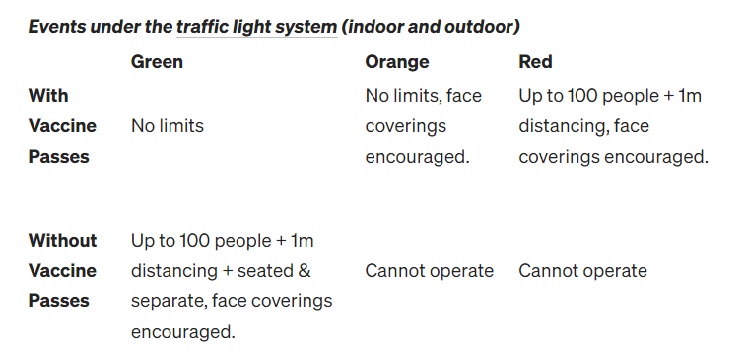
With the hasty introduction of vaccine pass protocols, venues in the orange setting could see out their end-of-year shows with full capacity. This included the Court Theatre’s Little Shop of Horrors. “To see a classic of the western canon given a reworking to platform and spotlight artists who historically would never be cast in it is nothing short of magic” wrote Nathan Joe.
In Auckland, Silo Theatre ended their year by pivoting to digital. For Matariki, Silo had produced audio experience Mauri Tau, written and directed by Scotty Cotter. Encouraging us to go on a solitary dawn hikoi, the matariki constellation (voiced by an incredible lineup including Rachel House and Tanea Heke) offered mātauranga along our journey. Just as Mauri Tau was a beautiful fill-up for our hauora in the middle of the year, Break Bread by Alice Canton, Freya Finch, Leon Wadham with Jarod Rawiri, offered sustenance at it end. Irene Corbett expressed in her review just how famished she had been for theatrical content:
I have only been able to watch one other ‘made in Auckland’ show in the last three months (The Birthday Girl by Albert Belz, performed on Zoom by the University of Auckland’s second year drama students) – if you don’t count dinner table drama over who doesn’t want to do the dishes today. So when I say I was theatrically famished I mean famished. Mention is made in Break Bread of the manna which fell from heaven to feed the Israelites and form the bread which sustained them during the 40 years following the exodus from Egypt and a show like this is manna to the theatre community: a nourishing gift in a time of need.
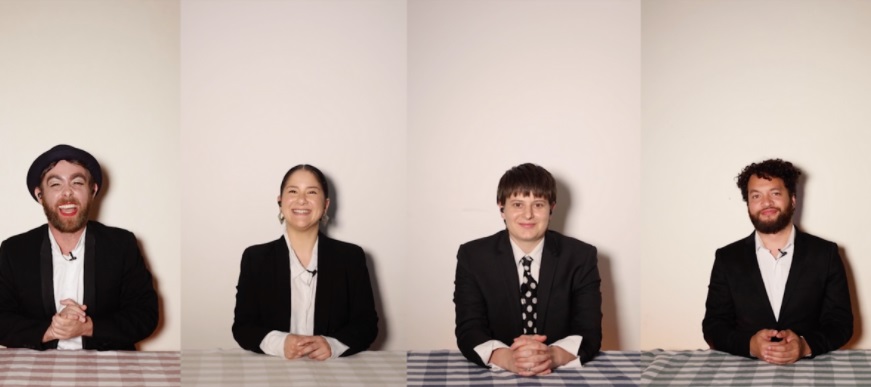
Originally planned for Silo’s 2020 season, Break Bread had been in a long cycle of development and Covid delay. The decision to go digital therefore came as something of a relief to the creators in offering an end goal, though the original premise of literally breaking bread with the audience had to move in a more metaphorical direction. Cast worked Bo Burnham Inside style to set up scenes inside their houses. While not all of the show’s themes landed, and the “livestream” description set up confused expectations, it was a joy to finally see the tenacity of Break Bread’s artists pay off. As Charlotte Maru-Lanning wrote on The Spinoff, “it’s near impossible to view this show without feeling a huge sense of empathy for Aotearoa’s Covid-ravaged creatives – or being moved by their persistence.”
In 2021 every time a show went on – whether in person or digital – was reason for celebration.
Changing Industry
In my piece When will Arts in Aotearoa get the Green Light?, I asked what it would mean if, after the past two years, the live arts sector was to find itself back at square one:
Square one means low wages, a medium income for creative work of $15,000, and a third of creative workers lacking a financial safety net. As Cat Ruka remarks, “severe financial hardship has become so synonymous with being an independent artist that we’ve come to accept it.” Square one means wellbeing challenges, burn out, and artists leaving the sector.
We need to move far beyond square one by investing in arts and culture for a more sustainable industry, to help us through the challenges of the pandemic environment.
The majority of New Zealanders recognise the value of the arts to provide individual and community connection, wellbeing, and meaning. As Colmar Brunton report, “The arts are making a powerful contribution to New Zealanders’ wellbeing, and are helping us get through COVID-19.
If a pandemic was going to come through and disrupt the entire industry, then we need to ensure there’s better industry once we get to the other side.
For instance, the Government’s approval of border exemptions for 126 international cast and crew from The Lion King musical as critical workers sparked debate about professional opportunities for New Zealand musical theatre performers and crew. Equity New Zealand requested a ministerial meeting and put out a statement saying that “while it’s always great for New Zealanders to see international productions we want New Zealand performers to be able to build their careers by being able to audition and be cast for these shows.” I weighed up the situation in a piece published with TheSpinoff:
The Lion King tour will likely have a net positive. It is promised 300 locals will be employed behind the scenes. Those 5 local kids [playing roles in the show] will have the gig of a lifetime playing the Spark Arena. Hospitality will be a winner. So will domestic travel to Auckland. If you want to fill Spark Arena and offer work to the casual staff, better to have a longer running theatre show then a one-off concert. … What stings is seeing the Government preference an international tour. It’s hard to sing Hakuna Matata when there is so much need in the local performance industry. The Lion King cannot be the only show in town.
As it happened, New Zealander Nick Afoa, who played Adult Simba in the West End, got the late call up to join the production.
A professional tour of Jersey Boys from G&T productions offered a point of contrast with The Lion King’s preferential treatement of international talent. With the exception of the crucial role of Franki Valli (filled by a performer who had played the part in USA and international touring productions), it was an all-local line-up.
And, oh what a night! Sharu Delilkan and Tim Booth wrote that G & T Productions risk in “staging this show during these tough Covid times” deserved audience support. Brigitte Knight noted that the team challenged “the deep-seated belief that local New Zealand productions are somehow inherently sub-par” and crushed “any opportunity for doubt.” With Jersey Boys leading the way, Aotearoa’s professional musical theatre sector is a growth area to cultivate.
Casting choices were put under the spotlight in Court and Circa Theatre’s co-production of Things I Know to Be True by Australian playwright Andrew Bovell. Delayed one year due to the 2020 lockdown, the production was called out for the harmful casting of a cis male actor in a trans role in an open letter from Rosemary Mitford-Taylor:
Casting a cis actor in this role enables real life violence towards the trans community as it perpetuates the dangerous, too often fatal misconception that trans women are cis men in costume – this is untrue… Trans women ARE women and it is non-negotiable that trans characters should be played by trans actors.
Maxwell Apse also explained to TheSpinoff the issues with casting a cis actor:
For a lot of people, they don’t necessarily know a trans person – so what they learn about trans people is what they see in the media, such as a local production of a play. When you cast a cisgender actor in a transgender role, you’re actually robbing the opportunity for a trans actor to tell a trans story.
Bottom line, appropriate casting of the role should have been the priority if choosing this play. It was disappointing that this occurred under the watch of respected queer theatre practitioners. Following community backlash, both Court and Circa issued apologies. Circa stated that “we realise this decision was wrong and we are accountable for it” and the Circa Council committed to “engage with the community face-to-face on a deeper level around this issue so that our processes are safe for all going forward.” Court Theatre welcomed “complexity of these conversations and moving forward we are committed to being active in the development of industry policies and guidelines to support transgender and gender diverse artists.”
The role was recast for the Wellington season. Since then, there has been no public follow up from Court or Circa detailing efforts made over the year to improve their practices. Hopefully this controversy will act as a clear line in the sand for theatre companies across the country: it is not acceptable to cast cis actors in trans roles. To ensure public accountability from our theatres, we might need an Aotearoa version of the Trans Casting Statement. Over forty original theatre and production companies in the UK were original signatories to the May 2021 statement, which begins with the pledge “We will never cast, or endorse a production that casts, a cisgender person in a trans, nonbinary or GNC [Gender non-conforming] role.” The statement includes commitment to “actively seek casting opportunities” for gender diverse practitioners and to challenge the marginalisation of non-white voices.” How our theatres support trans and gender expansive practitioners is mahi that must continue in 2022.
In December, the spotlight turned to cultures within theatre training and education, when Stuff exposed harmful practices at Toi Whakaari in a headline reading “New Zealand’s top drama school apologises to students for harm.” Reporting from Ali Mau and Andre Chumko detailed “a number of former and current students have told Stuff that during their time at the school, policies and procedures for dealing with toxic behaviour were insufficient at best, non-existent at worst.” Toi Whakaari director Tanea Heke acknowledged that “historically our kura has not always taken a consistent approach in regards to sexual harassment and harm. We have not taken people seriously enough and we have not examined our own practices well enough.” Hannah Clerk, one of the graduates to come forward, said “I want someone who is looking for answers like me to stumble upon my story and see someone standing up for themselves and not giving in to fear… It’s also time for Toi Whakaari to take some accountability.”
The Toi Whakaari exposé demands the entire sector take a hard look at whether our teaching and training processes are safe and robust. These issues are not exclusive to Toi Whakaari.
In the final Dominion Post arts column for the year, titled ‘Glimmers of hope for performing arts after difficult year’, Jean Sergent offered her hopes for a renewed focus on wellbeing in the industry:
Following the revelation of a toxic culture at Toi Whakaari, other training institutions need to examine if their policies and cultures are up to scratch in terms of prioritising the wellbeing of staff and students. Bullying and harassment should have no place in any industry, and live arts is no different.
Scarcity of money, space, and time mean that wellbeing takes a backseat to efficiency. […] I’d love to see my comrades earning a living, working in environments that are safe and healthy, with producers and directors who put the wellbeing of their employees first. The desire is there. The action needs to follow.
A seismic change that occurred in 2021 was a restructure of Auckland Theatre Company. Colin McColl bowed out as Artistic Director after 18 years (with Delta sadly disrupting his farewell season), with CEO Jonathan Bielski adding the Artistic Director role to his responsibilities. It sees the company experimenting with a new model, with artistic associates who will join ATC’s leadership team. Bielski told The Big Idea that “You have to have a point of view as a cultural organisation; at the moment that point of view is mine but over time, that needs to change – many other perspectives need to come in.” In Bielski’s 2022 season ATC are co-producing Oscar Kightley’s 1997 play Dawn Raids with Pacific Underground, of whom Bielski says would be impossible to do the play without: “They have a sort of a sovereignty over the way that story will be made and told.” The programming of Scenes from a Yellow Peril, by 2021’s Bruce Mason Playwrighting Award recipient (and Theatre Scenes contributor!) Nathan Joe, which was performed as a staged reading at the 2021 Auckland Arts Festival, points towards a promising new culturally responsive direction for ATC.
Finally, the results of Creative New Zealand’s latest Audience Atlas demonstrates the theatre sector need to make accessibility a top priority. As Andre Chumko Stuff reported, ‘About 1.7 million Kiwis find it hard to take part in the arts’. Systematic change is needed. As expressed by Circa’s former accessibility manager James Cain, “we are siloed to figure it out individually for ourselves … [we need to make sure] it isn’t an addition, but is an essential part.”
The Outlook Ahead
If we entered 2021 with a false confidence after a Covid-beating 2020, the theatre community ends 2021 bone tired, with our illusions shattered.
It feels foolhardy for anyone to be attempting to put on live theatre in 2022 when next year seems so uncertain.
I analysed what the move into the traffic light system could mean for live arts in Aotearoa in a piece for The Spinoff. I noted the warning from Te Pūnaha Matatini modeller Shaun Hendy that many of us may spend half to three quarters of next year in the red light setting (which would mean capacity of no more than 100 for events with vaccine passes). I concluded that “We can hope for green, but live arts need to prepare for red.”
With the first cases of Omicron reported in the community, the outlook for next year looks shaky. We need only look overseas for examples of what could befall live arts if Omicron is unleashed here. Broadway and West End are relying on swings and understudies, if not cancelling outright as Omicron rips through show companies. Hugh Jackman praised his The Music Man understudy co-star Kathy Votyko for taking to the Broadway stage with bare hours of rehearsal, only to contract the virus himself and bow out for a number of performances. In Canada, the Toronto production of Come From Away had reopened after a 21 month hiatus on December 15, only to permanently close a week later due to an outbreak amongst the company, the producer saying it was “bluntly apparent that it would be impossible to continue when this incredibly contagious variant has sent case numbers soaring.” In Australia, “Covid is sweeping through the casts of musical theatre shows in Sydney and Melbourne, with major live productions forced to cancel performances.”
One of the goals of Manatū Toanga’s Delta relief package was to give confidence for shows in the uncertain pandemic environment. After an entire year of calls for a Government backed arts insurance scheme, the $22.5 million Arts and Culture Event Support Scheme was launched on 30th November, designed to cover non-recoverable costs for events of 100+ capacity (up to 5000) impacted by red light setting restrictions or a local lockdown. This was just what was needed to ensure productions weren’t financially destroyed by Covid restrictions. However, there are serious limitations: you need to provide proof of a financial commitment to an event up to 29th November. This date is before the fund was even launched – what of shows that weren’t in a position to proceed with a financial commitment prior to this scheme? The scheme has a short time frame – it is for shows scheduled between December 17 and April 3. As of 20th December, only 23 events have registered for the scheme, suggesting it is not fulfilling its purpose.
Manatū Toanga need to sort the eligibility for its schemes so they reflect the reality of arts practice. The Independent Artists Survey found that Manatū Toanga support for artists and arts organisation at risk of going under is inaccessible for most practitioners – of 226 full time practitioners, only 17 were able to fulfil all criteria (7.5%). Half of those surveyed fell at the first hurdle – the requirement to hold a New Zealand Business Number. Manatū Toanga need to adopt a high trust model so support can actually reach those who need it.
Manatū Toanga need to do far more to help the arts sector through the pandemic next year.
So yes, it feels foolhardy for anyone to be attempting to put on live theatre in 2022.
Yet, that’s what we do.
It is what we must do.
Keep on flying.
Kia kaha theatre whānau.
SEE ALSO:
– The Pantograph Punch: 2021 sucked but there were still unforgettable moments
– The Big Idea: Scandal, Controversy & Speaking Up: The Lowdown Review of 2021
Theatre Scenes Theatrical Year in Reviews: 2020; 2019 ; 2018 ; 2017 ; 2016 ; 2015 ; 2014 ; 2013 ; 2012 ; 2011 ; 2010

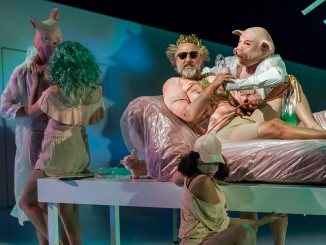
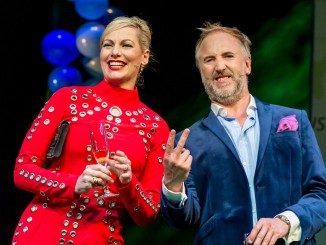
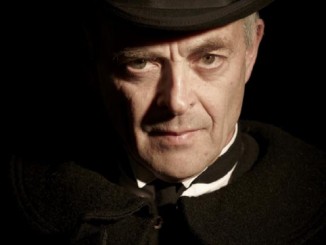
Leave a Reply